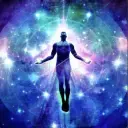For me it is Cellular Automata, and more precisely the Game of Life.
Imagine a giant Excel spreadsheet where the cells are randomly chosen to be either “alive” or “dead”. Each cell then follows a handful of simple rules.
For example, if a cell is “alive” but has less than 2 “alive” neighbors it “dies” by under-population. If the cell is “alive” and has more than three “alive” neighbors it “dies” from over-population, etc.
Then you sit back and just watch things play out. It turns out that these basic rules at the individual level lead to incredibly complex behaviors at the community level when you zoom out.
It kinda, sorta, maybe resembles… life.
There is colonization, reproduction, evolution, and sometimes even space flight!
Galaxies are not evenly distributed in space. Instead, when you look at the universe, galaxies are grouped in giant strings that look like a neural connections in a brain.
It blew my mind when I learned that we’re in a relatively dark, empty part of space compared to what’s out there. It really put into perspective for me how difficult space travel will be for us as we continue to advance.
It would have to be Gödel’s Incompleteness Theorem. Such a beautiful proof that shakes mathematics to its core.
The science communicator Veritasium made a nice video about it: https://youtu.be/HeQX2HjkcNo
I first learned about it in Douglas Hofstaedter’s masterpiece Gödel Escher Bach: An Eternal Golden Braid
Second the Gödel Escher Bach recommendation. Don’t really hear about that one these days.



